Migration
Journalism
Award
Sacrificed lives: on Romanian women looking after elderly people in Italy
published by Libertatea, Teleleu.eu, Romania
Imagine what it’s like living the life of someone old and ill before you are old and ill yourself. Canceling your own identity and conforming to the rhythms of their lives. Waking up in the morning when they wake up, washing them, making them breakfast, keeping them company 24 hours a day.
Cooking, playing cards if asked, cleaning around the house, sometimes being criticised by them and their family, watching the TV shows they want to watch, getting them ready for bed, going to bed at the same hour as them, waking up at night if they need you or shout out because of hallucinations – some patients have dementia or Alzheimer. Day after day, year after year, for 15, 16, 20 years of your life. Years you have not lived, because there was no more room for your own life, for walks, love, music, parties, family or friends.
You only have two hours off, but not every day and only if you’re lucky enough for the Italian family that employs you to at least observe this one right you have.
You live every day in the house of strangers, some of whom treat you kindly, while others don’t. Some count the biscuits you eat and ask you why you use so much of the coffee, others keep you in the cold in winter, asking you to do the laundry by hand and treating you like a servant for the whole family, though that was not your initial agreement.
You might be doing undeclared or semi-declared work in Italy, in other words either without a contract, or with one that only declares five or six hours a day, though you work 24/7. Of course, 24/7 work is illegal in Italy, but the families are unwilling or can’t afford to pay more tax or hire two badanti,* as necessary.
You accept it all, because you are forced by the debt and poverty back in Romania. You need this job, and your family in the country needs the money you earn.
Your pension will be small, so you can expect an old age with no safety net. You can only hope your sacrifice will not be forgotten by the children you helped.
You are far from your family. Your children have grown up without you and you feel guilty for it. Sometimes, relatives in the country treat you like an ATM. You are foreign to the life you left behind. You never feel “at home” with the elderly people you look after, no matter how kind your employer family is.
You grow attached to the elderly, because you spend two, five or ten years with them. You are the only person who is by their side every day, who knows their sufferings and their habits. You take care of them as they sink deeper into their illness, you are next to them when they start to agonise. You think of the life you never had a chance to live, because you’ve lived the life and death of these old people.
If you are lucky, the Italian family will let you stay with them for a few more days or a week, until you find another job, taking care of another elderly person. If you are not lucky and have no labour contract either, the family can throw you out from one day to the next. There is no guarantee in this line of work.
You take your suitcase and move into the house of another old person, to learn their habits and get acquainted with their suffering.
You read press articles that blame you for leaving your children home alone, with offensive comments. You don’t know who these people are, those who judge your life and decisions without knowing them.
You don’t know for how long you will continue to work in Italy, because your family always needs your help. Sometimes you return home years later, after falling ill yourself, away from your children, doing the hardest job in the world.
“If I had stayed in my country, I’d be long dead”
This spring I spent a few weeks in the southern Italian region of Puglia, where I met several Romanian women working as badanti. I spoke with them in the parks in the small towns of Lecce province where they go during the two hours off which they should have each day, but which they don’t always get.
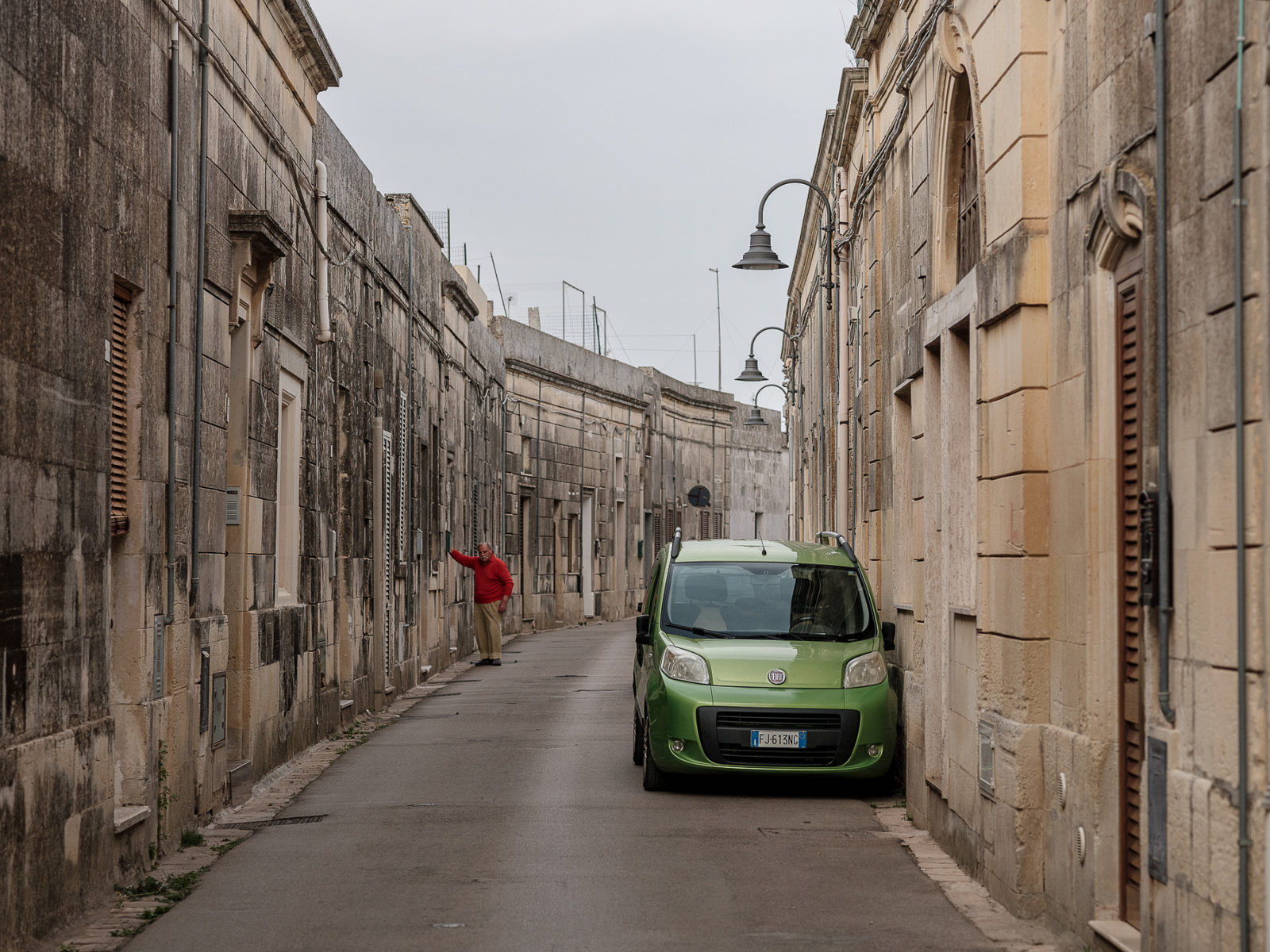
City of Cursi, Province of Lecce, Italy, May 2022. ©Cosmin Bumbuț
The reasons they left the country have been known for years and have to do with day-to-day life in Romania: unemployment, poverty, marginalisation of the vulnerable. Many Romanian women sacrificed themselves for their families when their husbands lost their jobs following the closure of factories or mines. Some are single mothers who have had to leave their children to afford raising them. Others were left without a workplace when textile workshops or various factories in Romania closed down.
In the weeks spent in Puglia, I discovered a phenomenon that should have started to worry us years ago, when a whole wave of Romanian women first left to look after elderly people in Italy: many of them fled the violence of their husbands. In the absence of programmes for survivors of domestic violence and shelters for women, migration was their solution for saving their lives.
After I published one of my articles on badante on our Facebook page, Teleleu, it gathered hundreds of comments, most of them from Romanian women looking after elderly people in Italy. Many of them said they ran away from the country because of domestic violence, but I was particularly impressed by this comment*:
“If it wasn’t for Italy, there’d be another little place in the world for me to hide from an abuser who, instead of rebuilding his life, is still looking for me to kill me for not putting up with his maltrato. I chose to live for my four children, even running away and doing honest work in this tough world, putting my life back together with someone else, because I wanted my children to be proud and happy. And today I am pleased with what I decided. If I had stayed in my country, I’d be long dead. This way I disfruto and am proud of my children, because they still have me and always had me to support them when they needed me.”
This is not the only woman who wrote to me saying she saved her life when she went to work in Italy. A. shared with me a similar story: “I was 25 when I was left to raise my child alone, after my mother told me she’d help me with her. So I left my daughter in Romania with her (biggest mistake of my life). The child’s father took drugs, beat me, was very jealous, once he wanted to drive his car off a bridge with me. He wanted to kill me. I was pregnant then, I miscarried because of the stress – and he said it wasn’t his baby. I called the police and left to work as a badante through an agency. I had no home, I had no one. I had no other choice.”
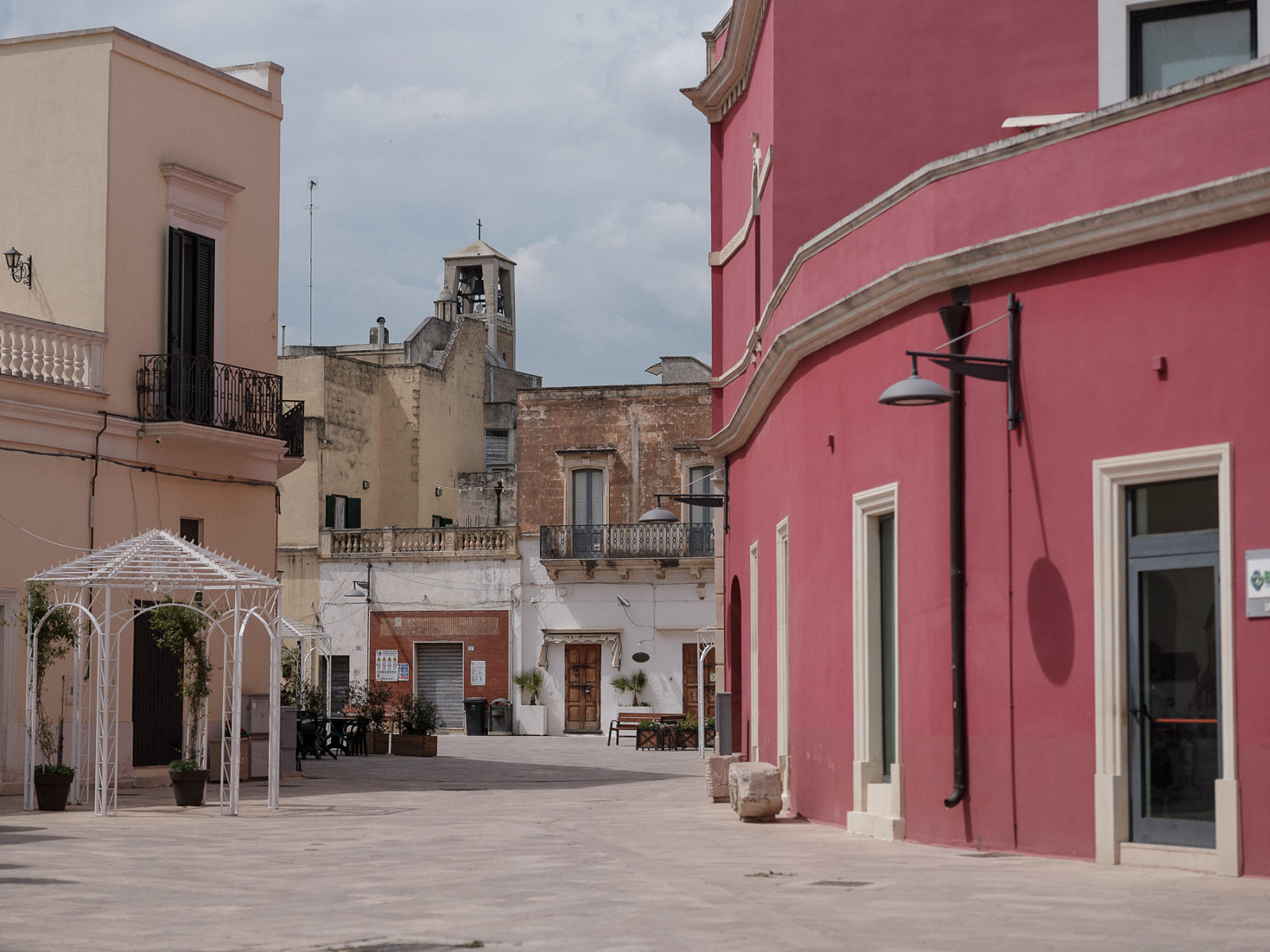
Leverano, Province of Lecce, Italy, May 2022. ©Cosmin Bumbuț
The Romanian state’s failure to build shelters, improve legislation and implement programmes supporting survivors of domestic violence has led to migration over the last few decades.
Migration is a consequence of the social problems faced by Romania, and when politicians speak of this phenomenon, they should also speak of solutions for survivors of domestic violence. 26.809 cases of domestic violence were reported in 2020, and 72 people were killed as a consequence, most of them women and children.
There is a direct link between migration and domestic violence, underage motherhood, racism, corruption, unemployment, the malfunctioning of the health and education system, as I have written before.
The number of Romanians living abroad is enormous: in Italy alone there are now 156.855 Romanian badante. The real number could be double, because DOMINA, an association for families, estimates that 57% of them do undeclared work. On the 1st of January 2021, there were 1.076.412 Romanians living in Italy.
She lost years of her life in exchange for the over 100.000 euro she earned in Italy
Eugenia was 43 in 2011, when she ran away from home because of domestic violence; she, too, saved herself by going to work in Italy. She used to live in Tulcea, in her parents’ old house, with her husband and 17-year-old daughter.
She borrowed 100 euro from a friend, packed some summer clothes and took the bus to Lecce, in southern Italy, where she had heard there was work to be found. She only had a pack of biscuits and some bagels – her food for the two-and-a-half-day ride. You can read her whole story here.
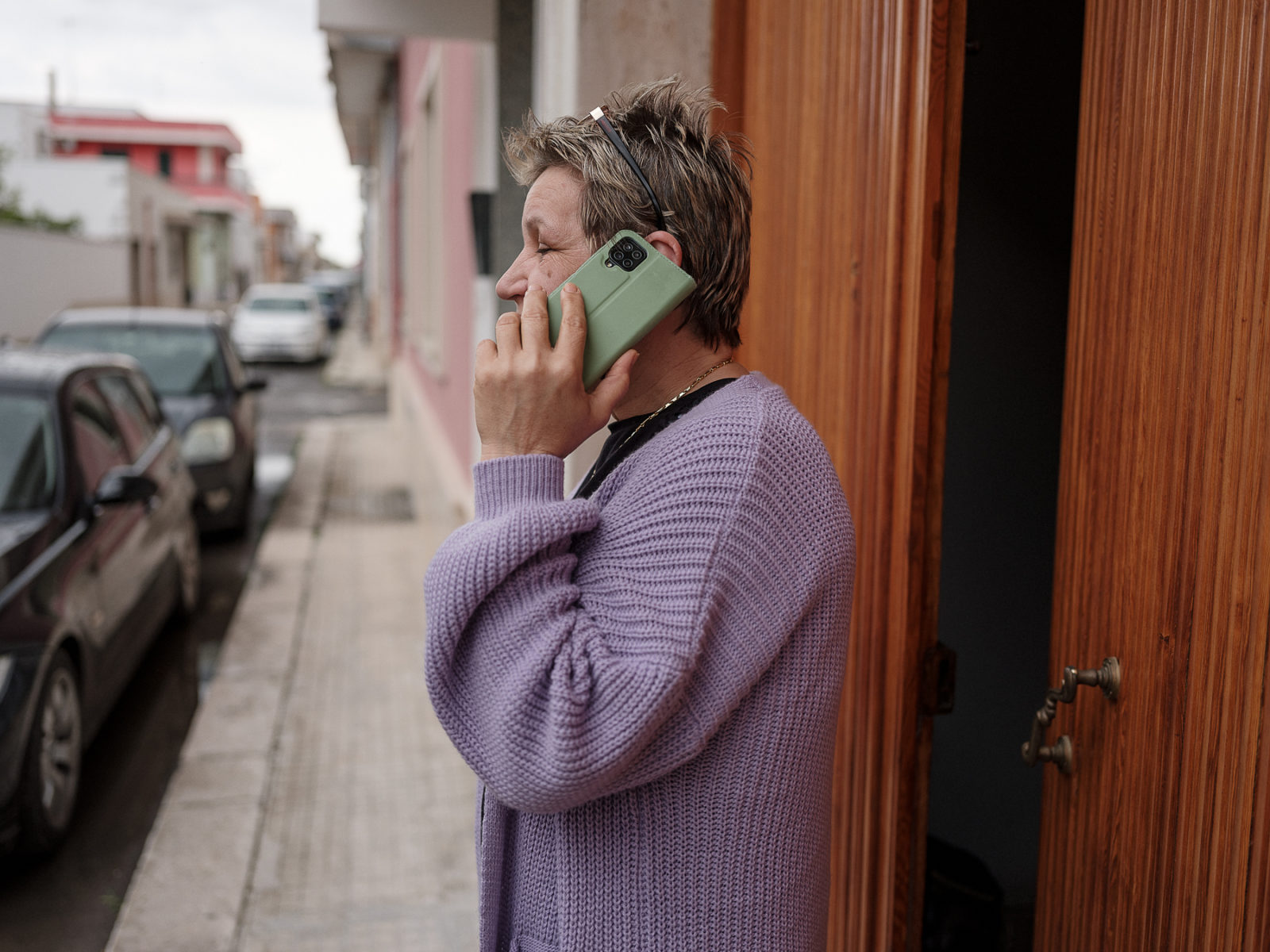
Eugenia, 54, cares for a 94-year-old woman from Leverano, Lecce province. The photo was taken in front of the house, on the street where he lives. Italy, May 2022. ©Cosmin Bumbuț
Ileana [a pseudonym] left Romania at 41 because of domestic violence: she was afraid she’d lose her life. Still, she continued sending money to her husband, because they have two children together and they built houses for them on the land they own.
Ileana often only kept 10 euro for herself, in case she fell ill and needed medicine. She did undeclared work, with no contract, because when you need money and don’t want to go back home to your violent husband, you’ll accept anything.
She was humiliated, offended and kept in the cold by the Italian families she worked for. She was treated as a servant, lost years of her life in exchange for the over 100.000 euro she sent to her family in Romania during her 16 years of work in Italy.
Now Ileana has nothing. Her husband won’t let her return to the house he has renovated with the money she earned in Italy. She has no legal recourse against him, because the land under their house and those they built for their children belongs to him, as inheritance from his parents. She wouldn’t dare take him to court anyway, because she is afraid of her violent husband.
She has no savings, because she has sent home almost all her earnings, and in a few years she will reach retirement age. This is just a manner of speaking, since Ileana will have no pension, considering she’s done almost all her work without a contract. So I reformulate: in a few years, when Ileana becomes unable to keep up with this hard work, she will have no home and no income to rely on.
She is not the only citizen in this situation, and the Romanian state is not ready for their return. Dozens of thousands of Romanian women, now badante in Italy, will return to the country in their old age. Some will come back to their violent husbands, because they have nowhere else to go. Others won’t be able to support themselves, because their work in Italy was undeclared.
How will we support these women? What is the Romanian state’s strategy for the social problems they will face – the lack of income in old age, violence from their partners, or situations like Ileana’s, in which families don’t let them come back after they sent them all the money they earned in Italy?
Their life is a series of sacrifices
Romanian women are used to sacrificing themselves, because local society has this expectation of them. And a badante’s destiny involves sacrifice, because living 15, 16, 20 years of the lives of elderly ill people whom you look after day after day until their death is no life.
Their sacrifice goes so far that some Romanian women even find extra work cleaning during the two hours off they should have every day, like Ionela told us. “Working as a badante is like being on house arrest,” a Romanian woman commented on our Facebook page.
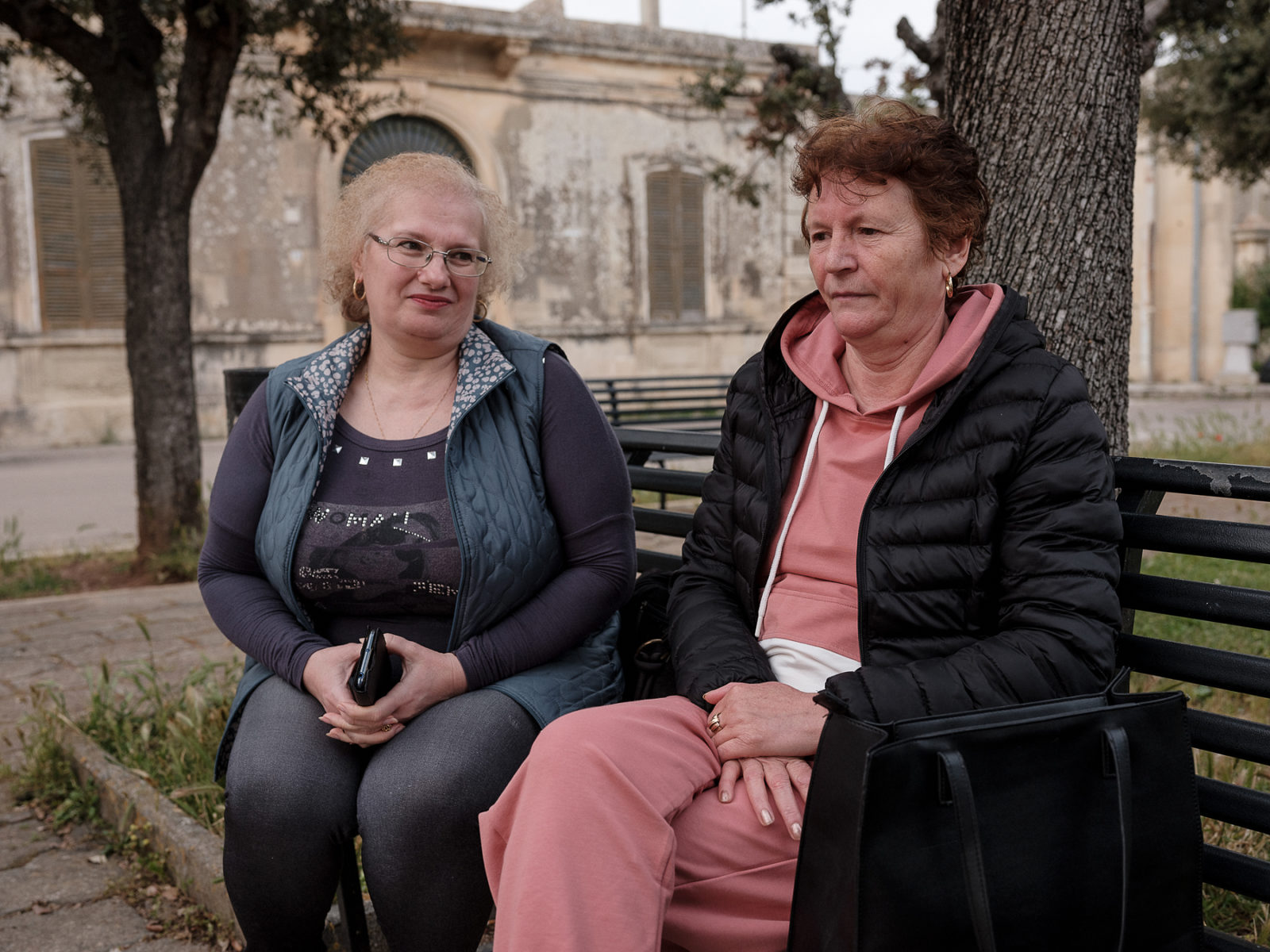
Mioara (left) and Neta (right), both from Craiova, work as maids in the town of Cursi, province of Lecce. Italy, May 2022. ©Cosmin Bumbuț
Priest Ioan Grancea of the Eastern Orthodox church “Sfântul Cuvios Irodion de la Lainici” in Lecce, Italy, says Romanian women don’t consider underclared work and unpaid holiday overtime a breach of their rights, because they come to Italy with the thought that they must sacrifice themselves for their families.
Many of them, apart from the difficulties they face in Italy, are subject to pressure from back home: debt they need to pay off, domestic violence, relationship problems, children who don’t understand their mothers’ sacrifices.
One of the stories that stayed with priest Ioan Grancea was the case of a Romanian badante diagnosed with fast-growing cancer while she was looking after an elderly man. The priest and a few members of the Romanian community helped her file a request for financial aid from the Italian state.
The woman didn’t wait for the documents to be processed; she found work with another family, who didn’t know she was ill. She took time off once a month to go to chemotherapy. Though the priest and the Romanian community around the church tried to convince her to change her mind, she wouldn’t hear of it – she told them she had to help her son, who was having trouble back in the country.
“To ask for your rights, first you need to afford it”
When people discuss the rights of Romanian badante and the abuse they suffer, some voices continue to blame the victims: Why do they accept to work in those conditions? Why don’t they ask for their rights?
Their vulnerability begins in Romania, the first country where their rights haven’t been observed. Romanians put up with abuse abroad because no one in their own country has taught them they have rights.
Many of the women were already badly paid and exploited in Romania. Eugenia worked at a bread factory in Tulcea, where she broke a leg going down stairs holding a crate with products. Though she limps to this day because of that work accident, the factory never paid her any damages.
Marcela grew up in a community in Curtea de Argeș where many women were beaten by their husbands, as she was. There are 30 families on Marcela’s street, and 10 women there have left to work abroad. For many Romanian women, Italy was a way out, because the Romanian state never held out a helping hand in the form of proximity bracelets for aggressors or sufficient beds in shelters.
Because they have always been on their own, these women don’t know how to ask for support from institutions when they are sexually abused. They are afraid, because in Romania domestic violence has crushed their courage.
Poverty makes you vulnerable, as one of the women who left a comment on our Facebook page put it best: “Is there any stronger force that can keep you there [in poor labour conditions] than debt and the wish to give your children a better life?”
“When you have children to raise, you work and that’s that. To ask for your rights, first you need to afford it,” another Romanian woman wrote to us.
“No one’s keeping you there by force, except for the need,” someone else said.
And a Romanian woman quoted “a saying” among badante: “Their shit [the Italian patients’] is our bread.”
The stories I learned in these last weeks are heartbreaking: single mothers, abused women, a widow who lost her job when the tailoring workshop that hired her closed, a young woman who remembers she was 14 when her mother went to Italy for work and she felt abandoned.
You can’t speak of migration without speaking of all these social problems generating it. You can’t cut out a slice of Romanian reality and ignore the whole context around it.
In the last few years, Italy has seen an influx of women from the Republic of Moldova, who come from even greater, more traumatising poverty than that in Romania – if, that is, poverty and its trauma bear any ranking.
Romanian badante blame the Moldovans for “ruining the market” because they accept undeclared work in poor conditions and for less money.
Others have complained that Romanian women don’t support each other, that they steal each other’s jobs, gossip and envy each other, ask their fellow badanti for money in exchange for finding them jobs. In the community in Lecce, a few badanti wanted to rent a one-room apartment together, to have it available for emergency situations – if one of them was thrown out by the family she works for, or is exploited by her employer, she would have this safe space to spend a week or two in, until she found a solution. They would have paid 10 or 15 euro a month each (rent is low in southern Italy), but the plan eventually fell through because of arguments between them.
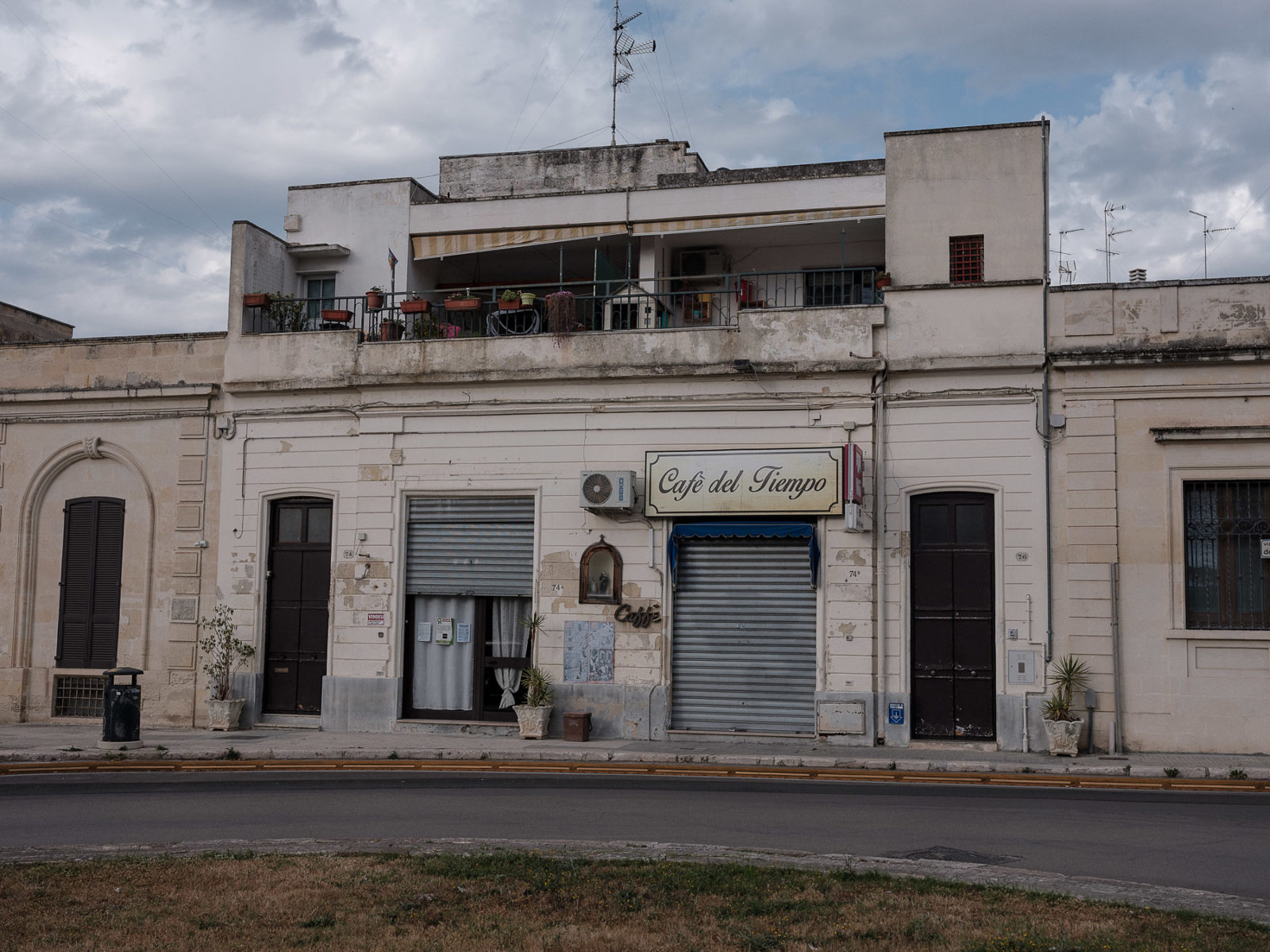
Lecce, Italy, May 2022. ©Cosmin Bumbuț
I was not surprised by the story, because solidarity is a value you learn when you have the privilege of a financially comfortable life. Poverty is ugly and humiliating, it mutilates many people, and its trauma remains and changes behaviours.
Victims blame each other, but the responsibility shouldn’t rest on their shoulders. The responsible parties are the Romanian and Italian state, but so far they have been accomplices to the abuse suffered by badante.
“The Italian state is an accomplice to this situation”
Silvia Dumitrache, the founder of Associazione Donne Romene in Italia, an association defending the rights of Romanian workers, says both the Romanian and the Italian state take advantage of the badante’s sacrifices: the Romanian economy grows with the money they send home, while Italy saves on expenses.
According to the DOMINA report, the overall cost of elderly care work paid by families amounts to 11,6 billion euro – which the Italian state saves, by no longer providing such care through its public assistance service.
Moreover, the Italian state gains money from the taxes paid by the families who sign employment contracts with their badante. Silvia Dumitrache says institutions turn a blind eye to many badante working 24/7 and to breaches of their rights: “The Italian state is an accomplice to the situation.”
Mirela Videa, employment and social affairs attaché at the Romanian Embassy in Italy, believes the Italian state should implement two solutions: providing tax rebates to families caring for elderly members and creating an institution to manage “the confluence between demand and offer”, allocating jobs and eliminating black market brokers, who exploit workers.
Silvia Dumitrache says Romania has the responsibility of informing Romanian workers, who should know their rights when they go work abroad.
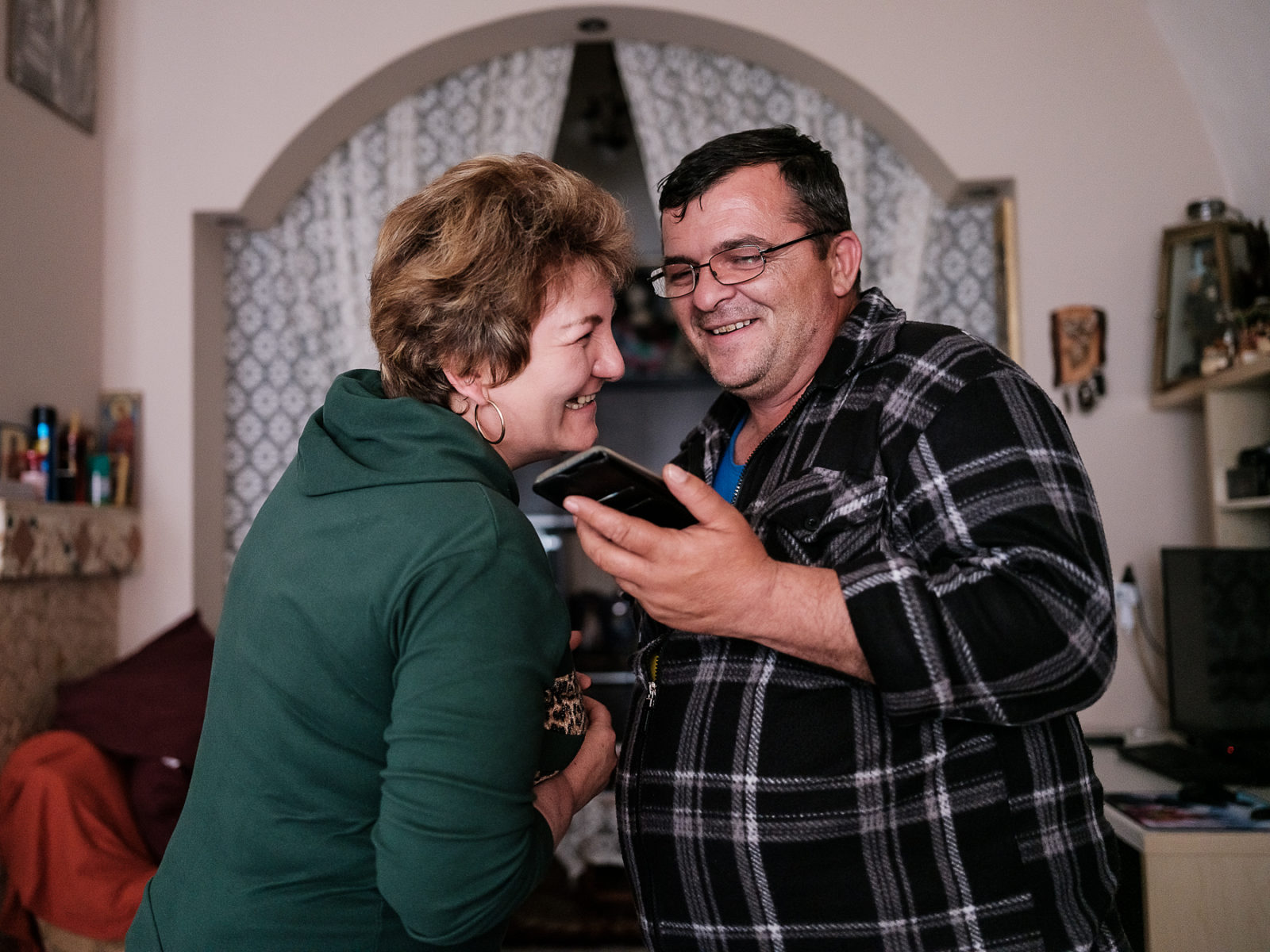
Ionela and Bogdan Potcovariu work as nurses in Italy. In 2011, they bought a house in installments in Neviano. May 2022. ©Cosmin Bumbuț
While I was doing interviews with Romanian badanti, I received two recurrent answers to the question “Why did you come work in Italy?” Many women told me they had debts from buying house appliances or from loans they took out when a family member died unexpectedly and they couldn’t afford the funeral.
Migration is only a slice of Romanian reality, in which women leave their children to be able to pay the installments for their washing machine.
***
Close to Easter, I published a material describing the atmosphere among Romanians spending the holiday in Lecce province. It included a few paragraphs about badanti who can’t make it to the Romanian store for their groceries nor to the Easter Vigil in the Romanian church, because they can’t leave their elderly people alone.
The material gathered many comments on Facebook – some from badanti, some from people who understand their suffering and sacrifice. Others were offensive and stunned me with their meanness and lack of empathy.
I will end with a few of these latter comments, so we can read them and feel ashamed. Because it is not just the institutions, but also us, common Romanians, who have a responsibility to see these women, to understand their suffering and to fight for their rights – rights that should be demanded not only by them, the victims, but also by us, who have the privilege of knowing solidarity.
They’re actually the Italians’ women..it’s just their citizenship that’s Romanian..😁 I know their likes 🤣
What a Bitter life better a svervant in my own country than for foreigners
Stay wherever you can make a good living but, you expats stop deciding the fate of those of us who stayed home.
Well stay there then, but stop moaning about how you miss your country ,your family.
Italian pensioners can afford “badante” while Romanian pensioners live on 5 lei a day .
We know their kind,no poso di parlare romena..🤣 Cheap women for the italians..🤣
In that case, if you’re doing so well there, they should withdraw your right to vote in the presidential and parliament elections, you’re the reason we were stuck with Basescu and Iohannis who ruined our country
You’re all sex slaves for the Italians
Anyway, you’d better give up Romanian citizenship, so we know who’s on our side and who isn’t .
well thats because back in the country you were an illiterate bum, there at least you wash some ass and can afford panetone from lidl. fucking illiterate scum, the moment you step outside the border you start badmouthing this country like it’s the country’s fault that you didn’t finish 8 years of school and lived your whole life in rubber boots, fuck your life in italy
Yes, they look after old people, while our own old people are left to die in misury.
no one’s asking you to come back slaaves
i … on you you’re their slaves and when you come to the country you act all big and forget romanian
Stay there, since you sold yourself for a ,,paneton,,
*I have decided to use the term badante in this text; it became commonplace in Romania in the early 2000s, when căpșunari (strawberry pickers) and badante (live-in carers) were the most important waves of migrations in our country yet. I find its social and cultural semantics crucial for the story of the Romanian diaspora. In Italy, the word badante is still used informally, though in public communication terms like “domestic worker” or “family assistant” are preferred.





